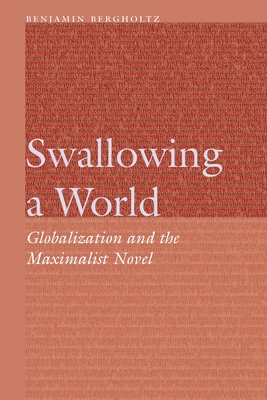Swallowing a World: Globalization and the Maximalist Novel

Swallowing a World: Globalization and the Maximalist Novel
Swallowing a World offers a new theorization of the maximalist novel. Though it's typically cast as a (white, male) genre of U.S. fiction, maximalism, Benjamin Bergholtz argues, is an aesthetic response to globalization and a global phenomenon in its own right. Bergholtz considers a selection of massive and meandering novels that crisscross from London and Lusaka to Kingston, Kabul, and Kashmir and that represent, formally reproduce, and ultimately invite reflection on the effects of globalization. Each chapter takes up a maximalist novel that simultaneously maps and formally mimics a cornerstone of globalization, such as the postcolonial culture industry (Salman Rushdie's Midnight's Children), the rebirth of fundamentalism (Zadie Smith's White Teeth), the transnational commodification of violence (Marlon James's A Brief History of Seven Killings), the obstruction of knowledge by narrative (Zia Haider Rahman's In the Light of What We Know), and globalization's gendered, asymmetrical growth (Namwali Serpell's The Old Drift). By reframing analysis of maximalism around globalization, Swallowing a World not only reimagines one of the most perplexing genr
PRP: 423.00 Lei
Acesta este Prețul Recomandat de Producător. Prețul de vânzare al produsului este afișat mai jos.
338.40Lei
338.40Lei
423.00 LeiLivrare in 2-4 saptamani
Descrierea produsului
Swallowing a World offers a new theorization of the maximalist novel. Though it's typically cast as a (white, male) genre of U.S. fiction, maximalism, Benjamin Bergholtz argues, is an aesthetic response to globalization and a global phenomenon in its own right. Bergholtz considers a selection of massive and meandering novels that crisscross from London and Lusaka to Kingston, Kabul, and Kashmir and that represent, formally reproduce, and ultimately invite reflection on the effects of globalization. Each chapter takes up a maximalist novel that simultaneously maps and formally mimics a cornerstone of globalization, such as the postcolonial culture industry (Salman Rushdie's Midnight's Children), the rebirth of fundamentalism (Zadie Smith's White Teeth), the transnational commodification of violence (Marlon James's A Brief History of Seven Killings), the obstruction of knowledge by narrative (Zia Haider Rahman's In the Light of What We Know), and globalization's gendered, asymmetrical growth (Namwali Serpell's The Old Drift). By reframing analysis of maximalism around globalization, Swallowing a World not only reimagines one of the most perplexing genr
Detaliile produsului









